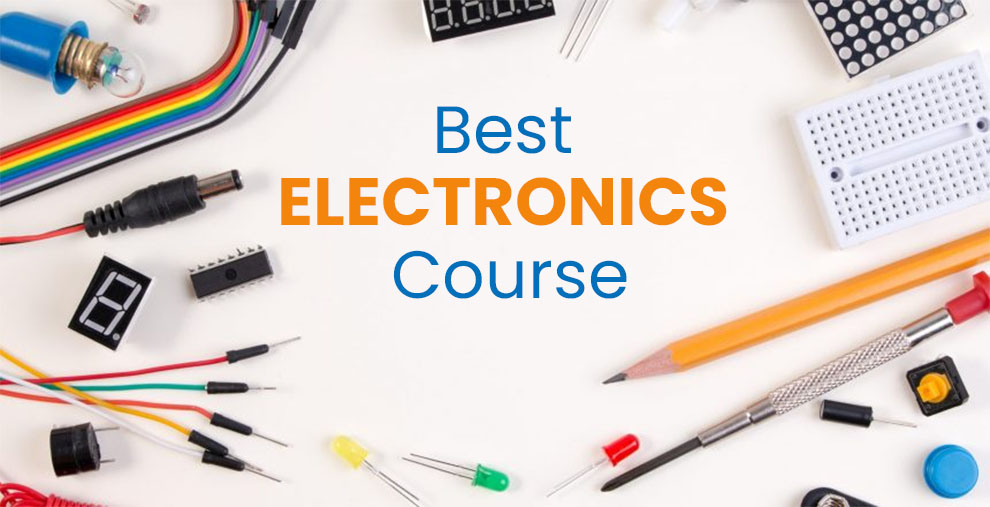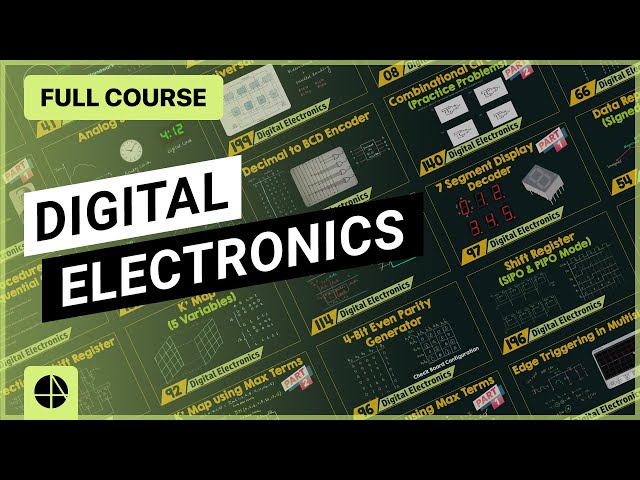My Journey into the World of Sparks: Why an Electronics Course Changed Everything
Once upon a time, not so long ago, I looked at a circuit board and saw nothing but a confusing mess of wires, tiny components, and what seemed like an impossible puzzle. The idea of understanding how a simple remote control worked, let alone building something complex, felt like a superpower reserved for a select few. Sound familiar?
That’s where my story truly begins. I was curious, yes, but also a little intimidated. I kept wondering, "Could I really learn this? Is an Electronics Course truly for someone like me, who barely knew the difference between a resistor and a capacitor?" Well, spoiler alert: it turns out, I could. And it completely changed the way I see the world around me.
The Flickering Spark: My First Steps into Electronics
My journey started with a decision – I was going to enroll in an Electronics Course. I remember the first day, walking into a lab filled with breadboards, multimeters, and various little boxes. It felt a bit like stepping into a mad scientist’s lair, but in a good way!
The instructors were fantastic. They didn’t just throw complex equations at us. Instead, they started with the absolute basics, the building blocks of everything electrical. We talked about voltage, current, and resistance – the "water pressure, water flow, and pipe size" analogy that finally made sense. It felt like learning a secret language, slowly piecing together what these invisible forces actually do.
My hands-on experience began almost immediately. We got our first breadboard – a magical plastic block where you can temporarily connect components without soldering. My first task? To make a tiny LED light up using a resistor and a power source. It sounds trivial, but when that little light flickered to life because I had connected it correctly, a genuine thrill shot through me. It was a tiny victory, but it proved that I could make things happen.
Unraveling the Mystery: From Basic Circuits to "Aha!" Moments
As the weeks went by, the Electronics Course moved beyond just basic components. We explored diodes (those clever one-way gates for electricity), capacitors (tiny energy storage units), and then, the big one for many beginners: transistors. These little wonders are the heart of modern electronics, acting like tiny switches or amplifiers. Understanding how they work was a real "aha!" moment for me. It’s like learning how a single letter contributes to forming a word.
We started building more complex circuits. Remember that blinking LED? Now, we were designing circuits that made LEDs blink at specific intervals, or even respond to light sensors. This is where the true fun began. We were not just copying diagrams; we were starting to design simple functions.
Of course, it wasn’t always smooth sailing. There were times my circuit just wouldn’t work. I’d check all the connections, scratch my head, and feel a surge of frustration. This is what they call debugging. And let me tell you, learning to patiently trace wires, test voltages, and find that one tiny mistake is an invaluable skill. When you finally fix it, and your circuit springs to life, the satisfaction is immense. It’s a bit like solving a detective mystery!
Bringing Ideas to Life: The Magic of Microcontrollers (and a Bit of Code!)
One of the most exciting parts of the Electronics Course for me was when we delved into microcontrollers. These are essentially tiny, programmable computers that can control your circuits. Think of an Arduino or a Raspberry Pi. Suddenly, our projects weren’t just reacting to simple inputs; they could follow complex instructions, make decisions, and even communicate with other devices.
This meant learning a bit of programming alongside the hardware. At first, the thought of writing code seemed daunting, but the instructors broke it down into simple, manageable chunks. We wrote lines of code that would make an LED fade in and out, control a small motor, or display text on a tiny screen. It was the perfect blend of physical creation and digital intelligence. This is where the world of DIY electronics truly opened up for me. Imagine building your own smart home device, a robot, or even a custom game controller!
More Than Just Wires: What an Electronics Course Teaches You Beyond the Bench
Beyond the technical skills, the Electronics Course taught me so much more.
- Problem-Solving: Every non-working circuit is a puzzle waiting to be solved. You learn to approach problems systematically, test hypotheses, and not give up easily.
- Patience: Electronics requires precision. One wrong connection, one tiny component placed incorrectly, and nothing works. You learn to slow down, double-check, and be meticulous.
- Logical Thinking: Understanding how different components interact forces you to think logically and predict outcomes.
- Creativity: Once you grasp the fundamentals, the possibilities for creating new things are endless. You start looking at everyday objects and thinking, "How could I make that smarter? How could I improve it?"
- Attention to Detail: Tiny components, specific wiring – it all demands a keen eye.
This course wasn’t just about becoming an engineer; it was about sharpening my mind and giving me a new lens through which to view the world.
Who Should Dive into an Electronics Course? (Hint: It Might Be You!)
So, who is an Electronics Course for?
- The Curious Mind: If you’ve ever wondered how your phone works, or why lights turn on, this is your entry point.
- The Aspiring Inventor/Hobbyist: Want to build your own gadgets, smart devices, or robot? This is your foundation.
- Future Engineers: If you’re considering a career in electrical engineering, robotics, or software, this course provides a fantastic practical head start.
- Anyone Who Loves a Challenge: It’s rewarding to build something with your own hands and see it work.
Don’t let the technical jargon intimidate you. Most good courses are designed to be beginner-friendly electronics experiences, guiding you step-by-step.
My Top Tips for Surviving (and Thriving!) in Your Electronics Journey
If you’re thinking about taking the plunge, here are a few things I learned along the way:
- Don’t Be Afraid to Break Things (Metaphorically): You’ll make mistakes. Components might get hot, LEDs might burn out. It’s part of the learning process. Just learn from it!
- Ask Questions: If you don’t understand something, speak up! Chances are, someone else in the class has the same question.
- Hands-On is Key: Reading books is great, but actually building circuits is where the real learning happens. Get your hands dirty!
- Start Simple: Don’t try to build a complex robot on day one. Master the basics, then gradually increase the complexity of your electronics projects.
- Document Your Work: Keep a notebook. Draw diagrams, write down what worked and what didn’t. It’s incredibly helpful for debugging and future reference.
- Find a Community: Online forums, local meetups – connecting with other electronics enthusiasts can be a huge source of inspiration and help.
The Road Ahead: My Future with Electronics
Today, I still look at a circuit board, but now I see patterns, potential, and possibilities. I understand the flow of energy, the logic behind the components, and how these tiny pieces come together to create the incredible technology we use every day.
My Electronics Course wasn’t just a set of classes; it was an awakening. It equipped me with skills, yes, but more importantly, it ignited a passion. I’m now constantly thinking of new DIY electronics projects, from automating things around my home to simply understanding the inner workings of my favorite gadgets. The future of technology is exciting, and knowing I have the skills to not just consume it, but potentially contribute to it, is a truly empowering feeling.
Ready to Electrify Your Mind? Your Electronics Course Adventure Awaits!
If you’ve ever felt that flicker of curiosity, that urge to understand how things work, then I wholeheartedly encourage you to explore an Electronics Course. It’s a challenging, rewarding, and utterly fascinating journey that could very well change the way you interact with the modern world. Who knows what incredible things you might build? Your adventure into the world of sparks, logic, and innovation is just waiting to begin!



